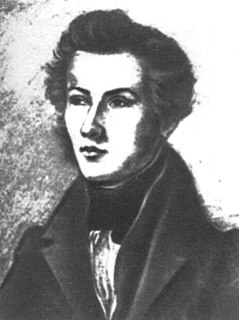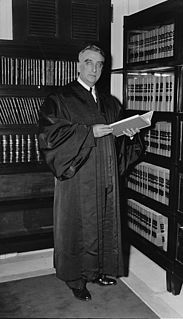A Quote by Richard Wagner
In no State is there a weightier law than that which centers its stability in the supreme hereditary power of one particular family, unconnected and un-commingling with any other lineage in that State.
Quote Topics
Related Quotes
It is unfortunately none too well understood that, just as the State has no money of its own, so it has no power of its own. All the power it has is what society gives it, plus what it confiscates from time to time on one pretext or another, there is no other source from which State power can be drawn. Therefore every assumption of State power, whether by gift or seizure leaves society with so much less power; there is never, nor can be, any strengthening of State power without a corresponding and roughly equivalent depletion of social power.
Law itself is either suspended, or regarded as an instrument that the state may use in the service of constraining and monitoring a given population; the state is not subject to the rule of law, but law can be suspended or deployed tactically and partially to suit the requirements of a state that seeks more and more to allocate sovereign power to its executive and administrative powers. The law is suspended in the name of "sovereignty" of the nation, where "sovereignty" denotes the task of any state to preserve and protect its own territoriality.
The pure Christian State is a State in which theological law prevails. This law attains to real power or, to be more exact, absolute power, when through its results which are identical with those of opium, it puts all parts of humanity to sleep. If some occasionally awake they carry out crimes that horrify humanity which has not yet become Christian in the full sense of the word or has already abandoned the Christian framework.
Family is a difficult matter. I must admit I do not know that the state can intervene successfully in a family. It's a fact that everything is connected with the individualist temperament, the kind of economic environment which stresses the individual, but this is not directly the result of a state policy, nor do I see any good way by which the state could intervene except in some marginal ways.
To understand political power right, and derive it from its original, we must consider, what state all men are naturally in, and that is, a state of perfect freedom to order their actions, and dispose of their possessions and persons, as they think fit, within the bounds of the law of nature, without asking leave, or depending upon the will of any other man.
... the State Legislatures will jealously and closely watch the operations of this Government, and be able to resist with more effect every assumption of power, than any other power on earth can do; and the greatest opponents to a Federal Government admit the State Legislatures to be sure guardians of the people's liberty.
Abortion on demand is the ultimate State tyranny; the State simply declares that certain classes of human beings are not persons, and therefore not entitled to the protection of the law. The State protects the 'right' of some people to kill others, just as the courts protected the 'property rights' of slave masters in their slaves. Moreover, by this method the State achieves a goal common to all totalitarian regimes: it sets us against each other, so that our energies are spent in the struggle between State-created classes, rather than in freeing all individuals from the State.
The error of Socrates must be attributed to the false notion of unity from which he starts. Unity there should be, both of the family and of the state, but in some respects only. For there is a point at which a state may attain such a degree of unity as to be no longer a state, or at which, without actually ceasing to exist, it will become an inferior state, like harmony passing into unison, or rhythm which has been reduced to a single foot. The state, as I was saying, is a plurality which should be united and made into a community by education
Citizens often think of a state's interests in terms of the promotion of ideals such as democracy, a particular way of life, or other values which they endorse or see as part of their historical continuity and identity. In this domain as in others values are not fixed, and so a state's interests are dynamic and in a constant state of negotiation and construction.
The Obama administration came into Utah and said, 'We're not going to listen to what the U.S. Supreme Court said. 'We, the federal government, are going to recognize marriages in the state of Utah and Utah state law explicitly does not recognize as marriage,' and that was really, in my view, an abuse of power.
I believe in absolute freedom of conscience for all men and equality of all churches, all sects and all beliefs before the law as a matter of right and not as a matter of favor. I believe in the absolute separation of church and state and in the strict enforcement of the Constitution that Congress shall make no law respecting an establishment of religion or prohibiting the free exercise thereof I believe that no tribunal of any church has any power to make any decree of any force in the law of the land, other than to establish the status of its own communicants within its own church.
The State did not originate in any form of social agreement, or with any disinterested view of promoting order and justice. Far otherwise. The State originated in conquest and confiscation, as a device for maintaining the stratification of society permanently into two classes-an owning and exploiting class, relatively small, and a propertyless dependent class. . . . No State known to history originated in any other manner, or for any other purpose than to enable the continuous economic exploitation of one class by another.







































